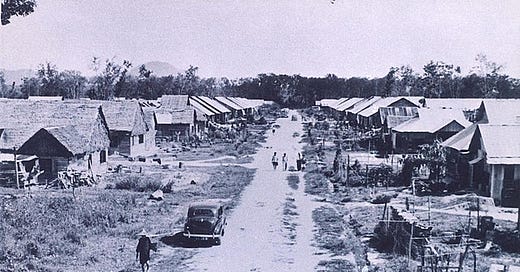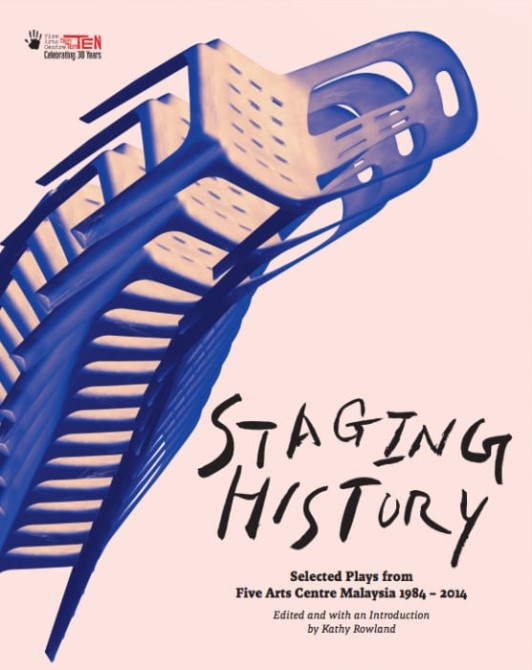I’ve had a couple of weeks off from sending out newsletters. I’ve been much too busy finishing other work, and I’ve also been at the In Other Words writers’ program, part of the OzAsia Festival in Adelaide. It was fantastic and I discuss it a little below, but there’ll be more details in future newsletters.
I’ve also swapped my newsletter platform to Substack. There are just more writers here than over on Beehiiv, which I was trying out before. Actually, Thomas Wharton convinced me to swap. I’m reading his posts all the time.
I’ll just keep experimenting with how I want to do this - stick with me and I’ll work out a routine.
Brand New - Social History of the Malayan Emergency
I am so pleased with my new review article in Bandung: Journal of the Global South, and I don’t mind saying so myself.
For one, it’s open-access, so I love that everyone can read it.
Second, it features Tan Teng Phee’s brilliant book, Behind Barbed Wire: Chinese New Villages During the Malayan Emergency, 1948-60. It discusses the book at length, of course, and you can read all that in the article - I won’t repeat it here. Importantly, though, it also talks about how the book paves the way for the rest of us to build a new social history of the Malayan Emergency. Finally, Tan sets up a basis for us to move on from endlessly rehashing the military histories and soldiers’ memoirs that centre the experience of British and Australian troops. He does this by finally addressing the lived experiences of the half a million or more Chinese Malayans those troops detained in the Emergency-era detention camps known euphemistically as “New Villages.”
Third, it draws on what Tan shows us to discuss the origins of the political parties and “consociational” structure through which Malaysian politics is conducted. Many colonial and elite nationalist histories argue the nation’s origins lie in the Reid Constitutional Commission, through which the British and elite Malay nationalists in UMNO - the United Malays National Organisation, founded in 1946 - drafted a constitution for Malaya, later Malaysia from the 1960s. This argument just isn’t good enough - it requires us to simply ignore the Emergency, which suspended all civil liberties for twelve long years. The nation was founded in the Emergency, I argue.
A Notional History
Speaking of the Emergency, while I was in Adelaide, I watched Mark Teh’s live documentary production, A Notional History, which excavates beneath school histories of Malaya’s decolonisation to try to understand its history of armed, communist struggle, which the textbooks obscure. For more details, here’s a review of the show by Patricia Tobin in Arts Equator. I even hosted an audience Q&A session with Mark and some of his cast after the show, which was really fun.
Mark is an artist and academic who works in Kuala Lumpur, and has long been associated with the Five Arts Centre. He gave me a copy of this great book, Staging History: Selected Plays from Five Arts Centre Malaysia 1984-2014, edited by Kathy Rowland. I’m looking forward to reading it.
A Previous Article
I also have a previous article on the Emergency, along with an introductory article I co-authored with Joshua Gedacht to the special issue of Itinerario: Journal of Imperial and Global Interactions that it appeared in. This article is on the way the Emergency expelled Malay communism - that is, the type espoused by many of the communists Mark interviewed and featured in A Notional History - from the Malayan, later Malaysian, geo-body. Of course, conservative developmentalist states all around the Muslim World fostered the idea that Islam and communism were incompatible during the Cold War, and the Malaysian context was no exception. Communism has been associated with Malaya’s Chinese minority ever since, effectively racialising the idea of Left, or even basic opposition, politics all the way into the present.
Recovering the history of the Malay Left, therefore, has to be an important priority for historians. Well, Mark and I are both on the case and while Mark has used interviews, I have been drawing on the archive of the Tenth Regiment - one of the Malay regiments of the Malayan National Liberation Army, the armed wing of the Malayan Communist Party during the Emergency - to do my work. I have more in progress now.
By the way, the special issue concerns the impact of such displacements on Muslim movements around Southeast Asia. It covers Indonesia in general, Aceh specifically, Patani after its Siamese incorporation, and Malaya, of course. The other articles are by Francis Bradley, Joshua Gedacht, David Kloos, and Chiara Formichi.
If you can’t access these two articles, or any of the others in the special issue (they’re not open-access, I’m afraid), get in touch and I’ll help you.




